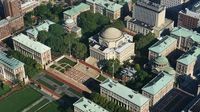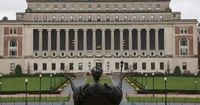Columbia University announced on Tuesday, May 6, 2025, that it has laid off nearly 180 staff members whose work was funded by federal grants impacted by the Trump administration's controversial decision to revoke the university's funding. This drastic measure follows the administration's cut of $400 million in federal funding in March, which was justified by accusations of the university's "inaction in the face of persistent harassment of Jewish students."
The administration's demands included a series of controversial measures: banning students from wearing masks at protests, hiring campus security officers with arrest powers, and appointing a new senior vice provost to oversee the department of Middle East, South Asian, and African Studies. Columbia's leadership, including acting President Claire Shipman and Provost Angela V. Olinto, detailed these developments in a letter sent out to the university community.
In the letter, university officials stated that they are engaged in a "two-pronged effort related to grants terminated by the federal government," which involves restoring partnerships with government agencies while simultaneously adjusting or reducing spending in the interim. They acknowledged the financial strain, stating, "Columbia’s leadership continues discussions with the federal government in support of resuming activity on these research awards and additional other awards that have remained active, but unpaid."
As a result of the financial challenges, the university has issued notices of termination or non-renewal to the 180 staff members, which represents about 20% of the staff funded by Trump administration grants. Officials indicated that some schools and departments will wind down activities, causing research infrastructure to operate with "lighter footprints." They emphasized that these decisions were not made lightly, asserting their commitment to the critical work of invention, innovation, and discovery.
Last week, around April 29, 2025, hundreds of Columbia University students, faculty, staff, and alumni participated in a 25-hour "speak out" to criticize the university's leadership for yielding to the Trump administration’s demands after the funding cuts. Student David Guirgis, who attended the rally, described the cuts as "an all-out attack on science and academic freedom." He emphasized Columbia's reputation, stating, "We are pioneers in biomedical research, legal research, and environmental science research, and all of that got cut simply because the Trump administration had a vendetta against universities," according to NBC News.
Columbia University officials have stated that they will continue to make prudent budget decisions, even in areas not directly impacted by federally funded research, to ensure the university's long-term financial stability. This includes implementing measures such as setting parameters that will result in most salaries not increasing for the next fiscal year, continuing to streamline the workforce through attrition, and launching a "voluntary retirement incentive program."
They noted, "In the coming weeks and months, we will need to continue to take actions that preserve our financial flexibility and allow us to invest in areas that drive us forward." The officials acknowledged the challenging landscape across higher education, remarking, "This is a deeply challenging time across all higher education, and we are attempting to navigate through tremendous ambiguity with precision, which will be imperfect at times."
The White House did not immediately respond to requests for comment following the announcement. The cuts at Columbia come amid a broader context of federal funding disputes with educational institutions. Earlier on May 5, 2025, the Trump administration informed Harvard University that it would not receive future federal funding until it complied with the government's demands regarding campus antisemitism and other issues.
Columbia's situation is particularly notable as it has been at the center of a pro-Palestinian and anti-Israel student protest movement that has gained momentum over the past year and a half, particularly in light of the ongoing conflict in Gaza. The Trump administration's actions against Columbia and similar institutions have sparked significant debate about academic freedom and the role of government in higher education.
Despite the turmoil, Columbia's leadership remains committed to restoring its funding and continuing its research mission. They assert that they will keep trying to persuade the government to restore the funding, and they have already begun discussions with federal officials to that end. However, the immediate future remains uncertain as the university grapples with the financial repercussions of the funding cuts.
The broader implications of these funding cuts extend beyond Columbia University, as they raise questions about the relationship between educational institutions and government funding. The ongoing tension reflects a growing divide in U.S. higher education, where political pressures increasingly influence academic operations.
As Columbia University navigates this challenging period, the outcomes of its negotiations with the federal government will be closely watched by other institutions facing similar pressures. The university's commitment to its research mission and the welfare of its staff will be pivotal in shaping its future in the coming months.


